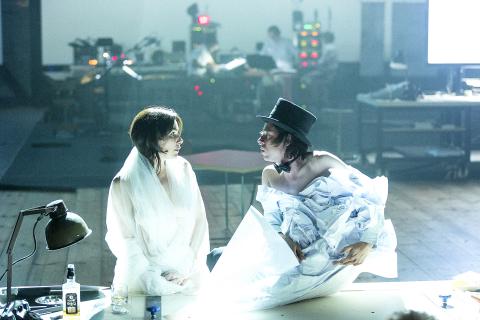Dutch national theater company Toneelgroep Amsterdam (TGA) is returning to Taipei this weekend after a two-year hiatus to close the Taipei International Arts Festival.
The troupe, led by its avant-garde artistic director Ivo van Hove, is to perform its thought-provoking, four-hour-long production adapted by Koen Tachelet from the novel The Fountainhead by controversial American author and philosopher Ayn Rand.
A play containing grand ideas about society and the relationship between the individual and the collective, the story follows Howard Roark, played by poet, actor and former Dutch “poet of the fatherland” Ramsey Nasr, who for this production learned to sketch architectural designs in the style of US architect Frank Lloyd Wright.

Photo courtesy of Jan Versweyveld and TGA
An ambitious and virtuous architect, Roark is willing to bear the ultimate sacrifice for his ideas: To forgo friendship and love, to be rejected by society and, ultimately, to destroy his own creation for the integrity of his architectural ideal.
This lonely process acquires another dimension when the protagonist meets Dominique Francon, powerfully played by lead actress Halina Reijn, who manifests herself as a kindred spirit as well as a formidable opponent in a relationship that is alternately creative and destructive — and which receives much attention in this stage rendering.
Since her breakthrough with The Fountainhead in 1943, Rand and her following have been a force to reckon with, where the author — who preached a philosophy of extreme rational self-interest dubbed Objectivism and reportedly features prominently on the reading shelves of US President Donald Trump and Speaker of the House of Representatives Paul Ryan — is in equal measures admired and reviled.
However, no such politically laden history of controversy exists in the Netherlands, where TGA staged the novel, which is not as widely read in Europe, but has inspired generations of architects and artists.
This has allowed the director to approach the material with fresh eyes, resulting in a play that conveys the full emotional depth of the story, but does not eschew giving Rand’s ideas full stage, whether through archetypal characters that personify the ideas at war in the story or a powerfully rendered double monologue that receives full stage, a flourish that, contrary to the novelist’s original, gives equal voice to both sides of the ethical dilemma facing the architect.
Dutch daily NRC Handelsblad said Van Hove has managed to keep a precariously balanced perspective, “cautiously guiding Rand past the abyss of her own ideology.”
The production is designed by Jan Versweyveld, who has cooperated with Van Hove on a series of high profile plays in recent years. While grand-scale designs do not always benefit a play’s intimacy, Versweyveld’s visually rich multimedia approach and spectacular stage are ideally suited to a story that combines ideas, intrigue and architectural design.
Live music is performed onstage and scenes are projected on a large screen, allowing the audience to follow the process of architectural creation.
The play is performed in Dutch, with English and Chinese surtitles, runs for four hours with an intermission and includes “adult content” — nudity, smoking and blood scenes.
Pre-talks are held 30 minutes before every performance in the theater’s lobby, with a post-show talk after the matinee on Sunday.

Towering high above Taiwan’s capital city at 508 meters, Taipei 101 dominates the skyline. The earthquake-proof skyscraper of steel and glass has captured the imagination of professional rock climber Alex Honnold for more than a decade. Tomorrow morning, he will climb it in his signature free solo style — without ropes or protective equipment. And Netflix will broadcast it — live. The event’s announcement has drawn both excitement and trepidation, as well as some concerns over the ethical implications of attempting such a high-risk endeavor on live broadcast. Many have questioned Honnold’s desire to continues his free-solo climbs now that he’s a

As Taiwan’s second most populous city, Taichung looms large in the electoral map. Taiwanese political commentators describe it — along with neighboring Changhua County — as Taiwan’s “swing states” (搖擺州), which is a curious direct borrowing from American election terminology. In the early post-Martial Law era, Taichung was referred to as a “desert of democracy” because while the Democratic Progressive Party (DPP) was winning elections in the north and south, Taichung remained staunchly loyal to the Chinese Nationalist Party (KMT). That changed over time, but in both Changhua and Taichung, the DPP still suffers from a “one-term curse,” with the

Lines between cop and criminal get murky in Joe Carnahan’s The Rip, a crime thriller set across one foggy Miami night, starring Matt Damon and Ben Affleck. Damon and Affleck, of course, are so closely associated with Boston — most recently they produced the 2024 heist movie The Instigators there — that a detour to South Florida puts them, a little awkwardly, in an entirely different movie landscape. This is Miami Vice territory or Elmore Leonard Land, not Southie or The Town. In The Rip, they play Miami narcotics officers who come upon a cartel stash house that Lt. Dane Dumars (Damon)

Jan. 26 to Feb. 1 Nearly 90 years after it was last recorded, the Basay language was taught in a classroom for the first time in September last year. Over the following three months, students learned its sounds along with the customs and folktales of the Ketagalan people, who once spoke it across northern Taiwan. Although each Ketagalan settlement had its own language, Basay functioned as a common trade language. By the late 19th century, it had largely fallen out of daily use as speakers shifted to Hoklo (commonly known as Taiwanese), surviving only in fragments remembered by the elderly. In